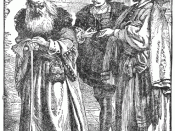Don't Judge Shylock By His Religion
Shakespeare's, "The Merchant of Venice," was written in the Elizabethan ages in a time when English Christians hated the Jews. A stereotypical Jew is greedy and would rather worry over money then his own life or the lives of others. They also say that that Jews are naturally evil and don't care about other people. In addition, the stereotype is that the Jewish are heartless to the extent that they are considered inhumane. Shakespeare creates a fictional Jewish character based on his idea of a 16th century Jew surrounded by Christians in the city of Venice. The Jew is Shylock, and he refutes the anti-Semitic stereotype of a Jew, by expressing that he is not greedy, not naturally evil and showing his humanity.
Shylock is not greedy about his money; despite the expectation of an instinctual Jewish greed, he only takes only the amount of payment that is rightfully his.
The bond that Antonio and Shylock agree on states that if payment is not paid when due, Shylock receives a pound of Antonio's flesh. After the Bassiano violates the deadline agreement, he offers Shylock twice the amount of what is owed in the bond. Shylock refuses Bassiano's offer and says, "If every ducat in six thousand ducats Were in six parts and every part a ducat I would not draw them;"(IV.i.85) Even when Bassiano offers money which is worth more then Antonio's flesh, Shylock refuses the valuable prize. It shows that Shylock does not only want money but will give it up for a revenge of no material value. When the court questions Shylocks right to Antonio's flesh, he challenges their rights to their own belongings that they say is rightfully theirs just because they bought...


